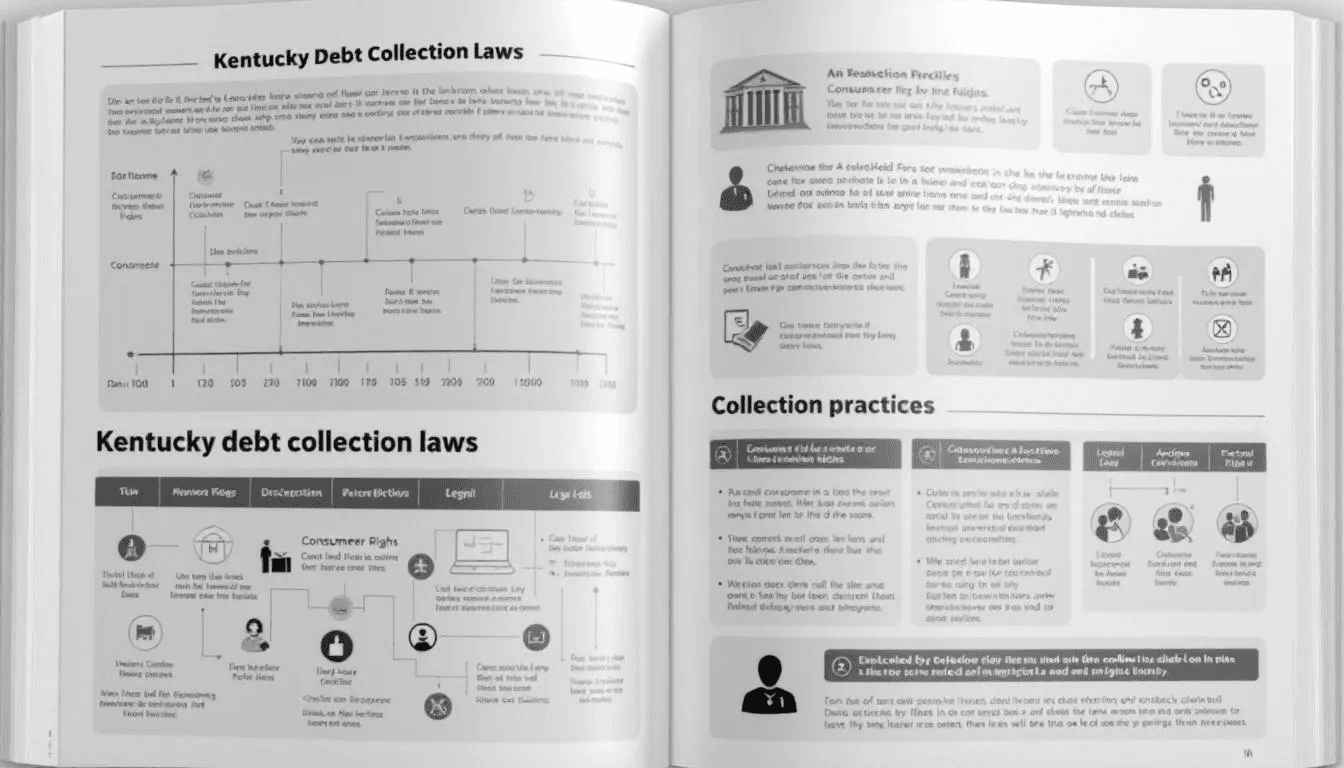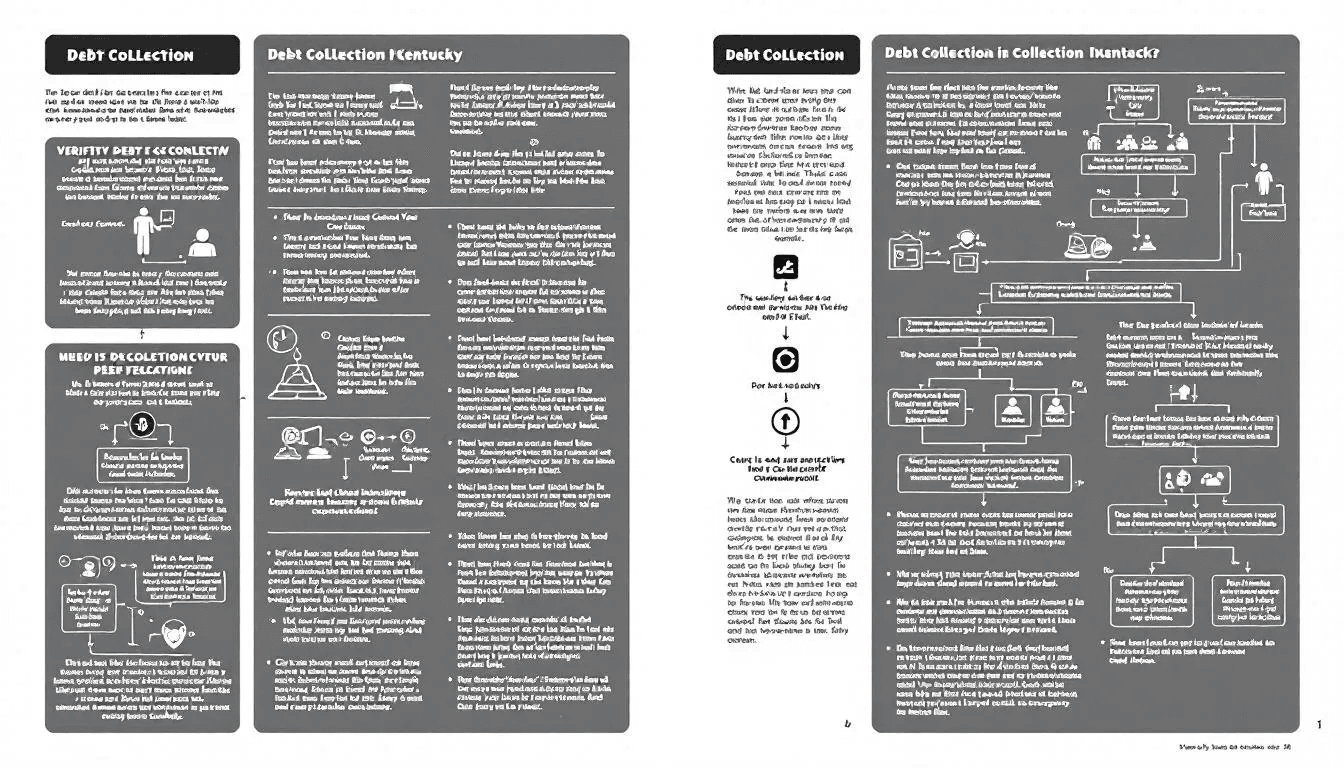Kentucky debt collection laws protect consumers from unfair practices and harassment by collectors. These laws dictate what collectors can and cannot do, ensuring your rights are safeguarded. This article will outline the key laws, your rights, and steps to take if a collector violates these protections.
Key Takeaways
- Kentucky debt collection laws, alongside the FDCPA, prohibit harassment and require debt validation within specific timeframes.
- Consumers can use cease-and-desist letters to stop communication from debt collectors and should be aware of their rights to challenge misleading practices.
- Understanding the statute of limitations on debts and wage garnishment limits can help protect consumers from aggressive debt collection tactics.
Kentucky Debt Collection Laws: An Overview


In the Bluegrass State, debt collection is governed by a combination of state and federal laws designed to protect consumers from unfair practices. Kentucky’s debt collection laws establish clear guidelines for how debt collectors must operate, ensuring that consumer rights are upheld against aggressive tactics. These protections are further enhanced by the Fair Debt Collection Practices Act (FDCPA), which sets federal standards to prevent harassment and deceptive practices.
Kentucky’s debt collection laws also include the Consumer Data Protection Act, effective since 2024, which limits how debt collectors handle personal information and enhances privacy protections. Together, these laws create a comprehensive framework to protect consumers from abusive debt collection practices and provide avenues for legal recourse if violations occur.
Prohibited Practices Under Kentucky Law
Debt collectors in Kentucky are prohibited from using harassment, threats, or misrepresentation as tactics to collect debts, including abusive language. This means they cannot use threatening language or imply violence, and they must accurately represent the amount of debt owed. These prohibitions align with federal laws, ensuring consistency in enforcement and consumer protection.
Kentucky residents have the right to challenge any harassment they encounter from debt collectors. Consumers can seek legal help and explore options under Kentucky law to prevent further harassment and take legal action if debt collectors engage in prohibited practices.
Required Debt Validation Process
Debt collectors in Kentucky must send a written notice detailing the debt within five days of initial contact. If the debtor disputes it within 30 days, the collector must provide verification.
This process ensures that debtors have the information they need to understand their debts and protects them from paying for debts they may not owe.
Legal Remedies for Violations
Debtors can take legal action, including court action, if a debt collector violates their rights under Kentucky’s debt collection laws, potentially resulting in damages and the recovery of attorney’s fees related to medical bills and debt lawsuits.
Debtors should meticulously document all communications with debt collectors to pursue legal remedies effectively.
The Fair Debt Collection Practices Act (FDCPA) in Kentucky


The Fair Debt Collection Practices Act (FDCPA) is a federal law that provides significant protections for consumers against abusive debt collection practices. In Kentucky, both federal and state laws work together to ensure that debt collectors adhere to fair debt collection practices, preventing harassment, deception, and unfair treatment.
Understanding the FDCPA empowers consumers to protect their rights and seek recourse against unfair practices. Complaints about unethical debt collection practices can be filed with local consumer protection agencies or the Better Business Bureau, providing additional layers of protection for Kentucky residents.
Kentucky Debt Collectors Must Follow Federal Law
Kentucky debt collectors are required to comply with the FDCPA, which governs how debts are collected and aims to prevent harassment, deception, and unfair practices. Consumers must submit debt validation requests within 30 days of first being contacted by a collector to challenge the legitimacy of the debt collection process.
These federal protections help Kentuckians safeguard their rights against abusive debt collection practices.
Key Protections Under the FDCPA
Under the FDCPA, debt collectors in Kentucky cannot:
- Contact debtors outside of reasonable hours
- Contact debtors at their workplace if requested not to
- Engage in harassment
- Make threats of violence
- Use obscene language
- Misrepresent the amount owed
Additionally, debt collectors cannot discuss debt details with third party debt collectors, except if the debtor’s attorney or spouse is involved. Debtors have the right to request written proof of the debt and challenge any inaccurate information, and collectors must halt collection activities until they provide verification of a disputed debt.
Statute of Limitations on Debt in Kentucky


The statute of limitations on debt in Kentucky varies depending on the type of debt. This legal timeframe restricts the period during which debt collectors can sue after notifying about debts. Factors influencing the statute of limitations include the state, time period, and debt type. In Kentucky, the statute of limitations for most debts is five years, though specific time limits apply to different types of debts.
Knowing the statute of limitations on consumer debt helps protect against lawsuits for old debts. The date of the last payment indicates if the debt is too old to collect, which can be advantageous.
Time Limits for Different Debts
In Kentucky, the statute of limitations determines the time period within which creditors can initiate lawsuits to collect debts. The limitation periods are:
- Five years for most debts, including credit card debt
- Five years for oral contracts
- Fifteen years for debts secured by real property, such as a mortgage
Written contracts executed after July 15, 2014, have a statute of limitations of ten years.
Impact of Expired Statutes on Debt Collection
Once the statute of limitations expires, creditors are prohibited from using legal means to recover the debt. This means debt collectors lose the ability to sue for payment on time-barred debts. However, unpaid debts remain consumer debt even after the statute of limitations has expired.
Debt collectors are not allowed to threaten legal action for time-barred debts as it is considered deceptive. If contacted about an old debt, it’s crucial to speak with an attorney to understand your options before making any payments, as making a payment can restart the statute of limitations.
Strategies for Managing Debt Collection in Kentucky


Managing debt collection in Kentucky requires a strategic approach to ensure fair treatment and protect your rights. Debtors should be cautious when contacted about old debts, as re-engaging with the creditor can restart the statute of limitations. Even if a debt is time-barred, it still exists and can impact your credit if not managed properly.
Kentucky offers various resources for affordable credit counseling and legal assistance to help residents navigate debt-related challenges.
Using Debt Validation Requests
Kentucky residents can use debt validation requests to verify the legitimacy of a debt and potentially halt collection efforts. A debt validation request verification should include the name and address of the original creditor, the amount of the original debt, and documentation of the debt.
Sending Cease-and-Desist Letters
A cease-and-desist letter is a formal request to debt collectors to stop contacting all communication regarding a debt. The primary purpose of such a letter is to prevent harassment and provide relief to the debtor, allowing them to seek advice or negotiate without pressure.
Negotiating Debt Settlements
Negotiating debt settlement can reduce the total amount owed and resolve debts amicably with creditors. Employing strategies for managing debt collection effectively helps maintain control over financial situations and could lead to favorable paid outcomes involving money.
Using debt validation requests allows debtors to confirm the legitimacy of debts, thereby positioning themselves better in negotiations. Additionally, sending cease-and-desist letters via certified mail can limit communication from debt collectors, providing debtors space to negotiate or seek advice without pressure.
Protecting Your Rights Against Aggressive Debt Collectors


Facing aggressive debt collectors can be overwhelming, but Kentucky residents have tools at their disposal to protect their rights. Utilizing debt validation requests and cease-and-desist letters can manage communication with debt collectors and ensure that collection efforts are legitimate.
Exploring rights under Kentucky debt collection laws can help prevent harassment and guide decisions about legal actions.
Filing Complaints Against Debt Collectors
Residents can file complaints about debt collection violations with the (CFPB) and the Kentucky Attorney General’s Office. If a debt collector violates the law in Kentucky, individuals can report the collector or sue them for their misconduct.
Debtors who win a lawsuit against a violating debt collector may receive actual damages plus up to $1,000 in statutory damages.
Seeking Legal Help
Partnering with experienced attorneys is crucial as they possess local expertise and knowledge of consumer protection laws. The focus of legal action when dealing with debt harassment is to stop harassment while protecting your financial future.
Seeking legal assistance can provide practical tools and templates to combat debt collection harassment effectively. Consulting with legal professionals or Kentucky legal aid services can provide vital support for navigating complex debt issues, including issues related to collection agencies.
Understanding Wage Garnishment in Kentucky
Wage garnishment is a legal process where a portion of an individual’s earnings is withheld to pay for debts. In Kentucky, wage garnishment is limited to 25% of an employee’s disposable income or the amount by which their income exceeds 30 times the federal minimum wage, whichever is lower. Understanding these limits can help debtors protect their earnings and manage their financial obligations.
Individuals can contest improper wage garnishment by filing a motion with the court to challenge the legitimacy of the garnishment order. Understanding their rights and consulting legal experts allows debtors to safeguard their income from excessive garnishment and ensure appropriate amounts are withheld.
Limits on Wage Garnishment
In Kentucky, the maximum amount that can be garnished from an employee’s paycheck is 25% of disposable earnings or the amount exceeding 30 times the federal minimum wage, whichever is lower. Disposable earnings refer to the income remaining after legally mandated deductions, such as federal and state taxes.
Additionally, Kentucky law protects essential income and assets from garnishment, including Social Security and a portion of wages.
Steps to Contest Improper Garnishment
It is crucial for debtors to contest improper wage garnishment within the specified time frame to protect their exempt funds. If a debtor does not contest a garnishment within the specified time, funds are sent to the court judgment creditor without a hearing.
If a hearing is scheduled due to a challenge, the court will determine if the garnished funds are exempt based on the provided evidence. The outcome of a garnishment hearing can result in the return of garnished funds if they are deemed exempt.
Key Takeaways
Familiarizing yourself with the Fair Debt Collection Practices Act (FDCPA) and Kentucky’s debt collection laws is essential to protect against harassment and unfair practices. Key takeaways include:
- Understanding your rights to request debt validation
- Using cease-and-desist letters to halt unwanted communication
- Knowing the statute of limitations to avoid time-barred debts.
Additionally, knowing the limits on wage garnishment and how to contest improper garnishment can safeguard your earnings and financial well-being.
Summary
Understanding Kentucky’s debt collection laws and the FDCPA can empower you to manage your debts effectively and protect your rights against aggressive collectors. By utilizing debt validation requests, cease-and-desist letters, and negotiating debt settlements, you can navigate the debt collection process with confidence. Seeking legal help and knowing your rights regarding wage garnishment can further ensure your financial stability. Armed with this knowledge, you can face debt collection challenges head-on and secure a fresh start for your financial future.
Frequently Asked Questions
What is the 7 7 7 rule for collections?
The 7 7 7 rule, often referred to as the 777 rule, stipulates that a creditor cannot contact a debtor more than seven times within a seven-day period, protecting consumers’ rights during debt collection. This framework ensures that communication remains reasonable and manageable for those in debt.
What are the main protections for consumers under Kentucky’s debt collection laws?
Kentucky’s debt collection laws primarily protect consumers from harassment, threats, and misrepresentation by debt collectors, and grant them the right to request debt validation and pursue legal action for violations. These protections are essential to maintaining fair and ethical debt collection practices.
How long do debt collectors have to provide debt validation in Kentucky?
In Kentucky, debt collectors are required to send a written notice detailing the debt within five days of initial contact, and if the debtor disputes the debt, they must provide verification within 30 days.
What is the statute of limitations for credit card debt in Kentucky?
The statute of limitations for credit card debt in Kentucky is five years, after which debt collectors cannot initiate legal action to collect the debt. It’s important to be aware of this timeframe for managing your financial obligations.
How can I stop debt collectors from contacting me?
Sending a cease-and-desist letter is an effective way to stop debt collectors from contacting you. This formal request obligates them to cease all communication about the debt.

